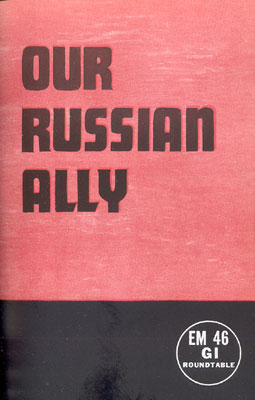By Vera Micheles Dean
Research Director, Foreign Policy Association
(Published January 1945)
 Table of Contents
Table of Contents
The Peoples of the Soviet Union
What Is the Russian Country Like?
What Was the Bolshevik Revolution?
How Much Personal Freedom in Russia?
What Is the Soviet Economic System?
Can Russians Own Personal Property?
What Is Russia’s Foreign Policy?
Are They Realistic in Foreign Affairs?
What Was the Third International?
Will Russia Share in Reconstruction?
Does the U. S. Get Along with Russia?
Introduction
“We cannot forecast to you the action of Russia. It is a riddle wrapped in a mystery inside an enigma.” Winston Churchill, not yet prime minister of England but long since a prime master of the English language, was speaking over the radio just a month after the outbreak of the war. He went on in the next few sentences to unlock the enigma and lay bare the riddle. But it was his epigram that stayed in the popular mind and became a phrase often quoted in discussions about Russia. For it struck a responsive chord among many people who are vague and puzzled about anything and everything Russian. As a matter of fact, the Russians are no more mysterious than anybody else, once you get to know them. Most people in the United States and western Europe have simply not taken the trouble to learn much about Russia. So let’s start by finding out something about who the Russians are and why they seem mysterious to other people.
More than 57 varieties
To begin with, sweeping generalities about the Russians have to be avoided. There is no such thing as the Russian people. Instead, there are about 175 different national and racial groups living side by side in the Soviet Union. Only the three largest groups are properly called “Russians.” First among these are the Great Russians, who settled the central part of European Russia and many of whom later helped to develop Siberia. Next are the Little Russians or Ukrainians, who live in the southwestern part of European Russia—from Poland to the Sea of Azov. And third come the White Russians, who live in the western region bordering on prewar Poland and Lithuania.
These White Russians, incidentally, are a branch of the Russian people racially. They should not be confused with the antirevolutionary “White” Russians who opposed the “Red” Russians (Bolsheviks) in 1917 and the following years.
The old Russian Empire of the czars was built up and ruled over by Great Russians, for the most part. They also predominate in the Soviet Union today. That is why the terms “Russia” and “Russians,” although not strictly accurate, are still commonly used in Western countries as handy names for the Union of Soviet Socialist Republics and all the many peoples that live within its borders.
The lesser groups
Besides the three main Russian groups, there are scores of other “nationalities” ranging in numbers down to obscure Asiatic tribes. Some of them in the remote reaches of Siberia live in ways hardly improved since the Stone Age. Other Soviet peoples, in areas nearer the birthplaces of civilization, can boast of ancestors who were highly cultured when the inhabitants of western Europe were still barbarians.
There are some 5 million Uzbeks, nearly as many Tatars (or Tartars), then down the scale of numbers through Kazaks, Jews, Azerbaijan Turks, Georgians, Armenians, Mordvens, Chuvashes, Tadjiks, Kirghiz, Bashkirs, and many others. Stalin, incidentally, is a Georgian.
Groups with more familiar names—Finns, Poles, and Germans—are also to be found in Russia. Most of the Finns live in the Karelo-Finnish Soviet Socialist Republic formed in 1940 of the territory ceded by Finland to Russia after the “Winter War.”
Related Resources

September 7, 2024
Travel and Trade in Later Medieval Africa

September 6, 2024
Sacred Cloth: Silk in Medieval Western Europe

September 5, 2024